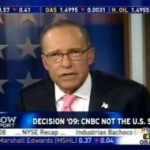Financial journalism on TV has always been a difficult job.
First, the mass audience is largely uneducated about the topic. Second, investing is a long-term process, but TV needed an exciting, immediate return for its advertisers. Third, the topic needed to be re-invented to make it exciting. Finally, it could not be purely educational, so programs had to demonstrate they could either produce consistent profits or create wealth for their mass audience.

But since the first financial TV show was broadcast in 1966 by KWHY in Los Angeles, TV financial shows have steadily become more sophisticated, data-driven and, in some cases, dependent on personalities, who were either doctrinaire, myopic about the needs of their mass audience, or too focused on short-term day trading recommendations. (For a more complete history of financial TV journalism, see Chapter 5 in the book, “How 401(k) Fees Destroy Wealth and What Investors Can Do To Protect Themselves.”)
This formula worked well, but the tremendous wealth which was destroyed as a result of the 2008 recession may finally be taking its toll on key segments of this established TV financial journalism format.
Recent (August 29, 2013) Nielsen TV ratings showed that viewership on some shows are at a 20-year low, and at CNBC, a pioneer in the field, there are just 37,000 viewers aged in the key demographic group (25-54) in any 24-hour period.
According to the New York Post:
“Particularly hard-hit programs were “Fast Money,” “Mad Money” and “The Kudlow Report” — each of which saw all-time lows in total viewers this month.
“Larry Kudlow’s 7 p.m. show fell the most, recording just 20,000 viewers in the key advertiser demographic, a 53% decline.
“Similarly, Jim Cramer’s “Mad Money” was off 38%, to 25,000 viewers, in the key demo. “Street Signs,” was the only show to retain its audience.
“Rival Fox Business Network drew an average of 10,000 viewers an hour in the same key demo. It also saw viewership declines.”
A Conspicuous Failure To Address Audience Issues
While there are many possible explanations for these declines, three of the better ones address critical issues many of these major on-air programs have conspicuously failed to address:
–The failure to discuss why trillions in wealth that has been destroyed in the 2008 recession;
–The rigid adherence of some personalities, such as Larry Kudlow and others, to the free market doctrine that unbridled, unregulated capitalism is the best way to create wealth;
–That the mass audience of middle-class Americans has lost not only their wealth, but their faith in the system’s ability to re-create their lost wealth through investing in either financial instruments and real estate.
This last possibility indicates that the American Dream, which is after all what the financial TV programs implicitly promote, is not working today for millions of potential viewers.
What Happens When a Mass Audience Disconnects
Today’s political economy does not match the actual experience of millions, so there is an inherent disconnect

between many of these programs which consistently highlight economic data, stock picks, expert interviews, and endless predictions about the next great sector or stock.
To the average American who has watched these shows even peripherally, the data and debate format is numbing, but even worse none of the shows are politically positioned to address critical household issues, such as real wage stagnation, the need for more affordable health care, and whatever happened to the nation’s major wealth building engines—portfolio investments, housing equity, wages increases, savings, 401(k)s, pensions and inheritances.
Each one of these engines contributed something to wealth creation a few decades ago, but today, every one of these individual wealth-building pistons is either failing to perform or working at a fraction of their capacity. Worse, market volatility and the long-term damage from recessions threatens to create another decade of lost investment returns. And while the mass audience cannot articulate their unease, they instinctively know that something is very wrong.
Maybe this is reading too much into these temporal Nielsen numbers. But as a veteran financial journalist and financial marketer, the message from many of these TV shows, especially the ones cited above which have fallen dramatically in their ratings, is not unexpected. Doctrinaire financial journalism is never right for long, and

the claims by Larry Kudlow, for instance, that the LIBOR bid-rigging scandal did not have any victims, cannot go unnoticed as anything but a wild claim. (“I mean, maybe you’re right, the victim was the lender, Barclays. But I don’t know. The Justice Department says this could be a criminal prosecution. I don’t get that. Who are the victims? Who are the victims?” Kudlow quote cited from the article, “Larry Kudlow Says the Libor Conspiracy Has No Victims. That’s Grotesquely Wrong,” by Eliot Spitzer.)
It is also worth noting that Keynesian and other non-mainstream economists do not get the air time of their more conservative Austrian or Libertarian counterparts, although this would have to be verified by someone with more resources than I have.
Finally, the decline in ratings at CNBC and FOX also provides an opening for a new form of financial journalism with a different political-economic perspective to vie for the viewership of average Americans. After all, in order to attract a mass audience, financial TV programs should have messages which appeal to the real-world financial conditions of its audience. Right now, the middle-class is hurting financially, but you would never know that watching CNBC and FOX.










